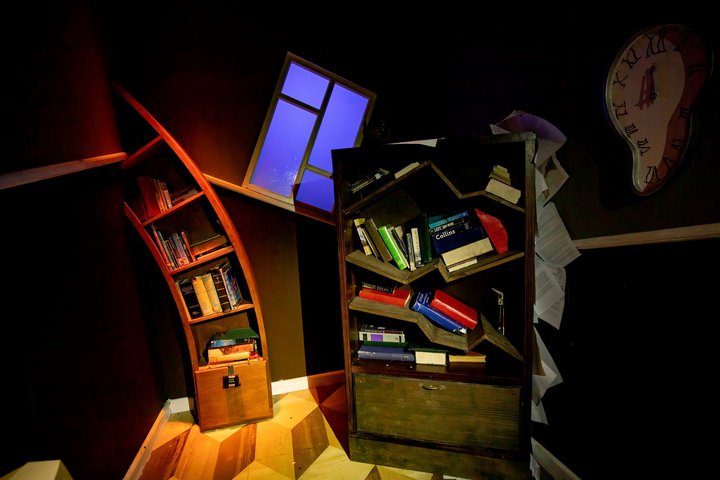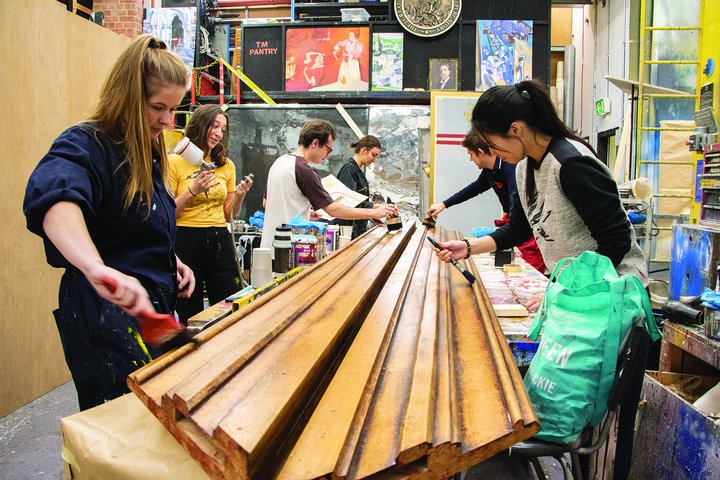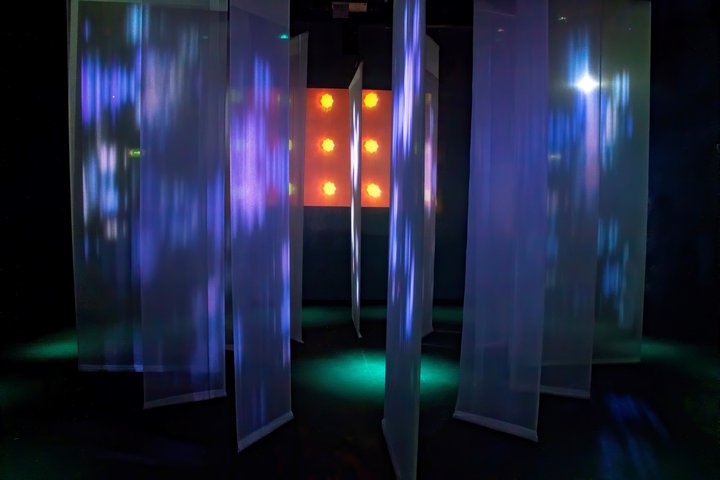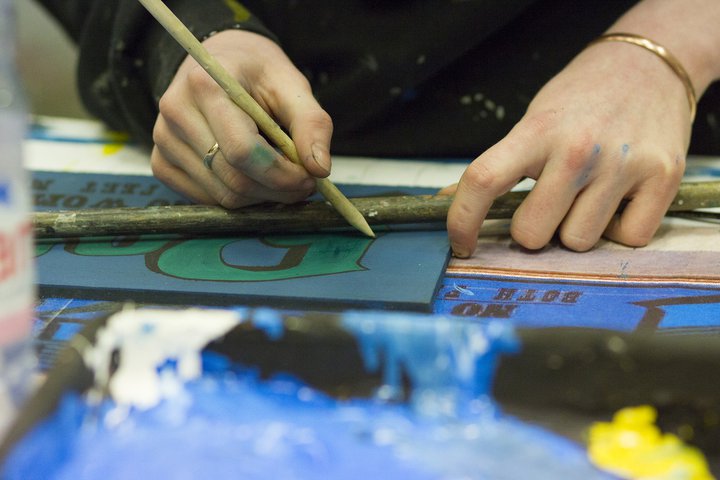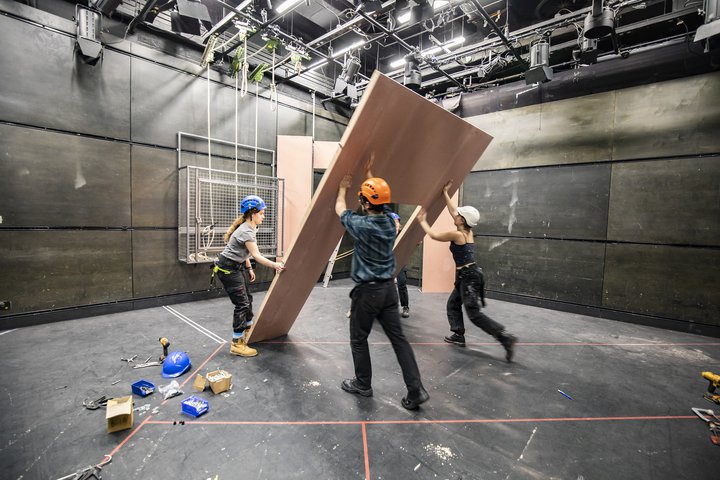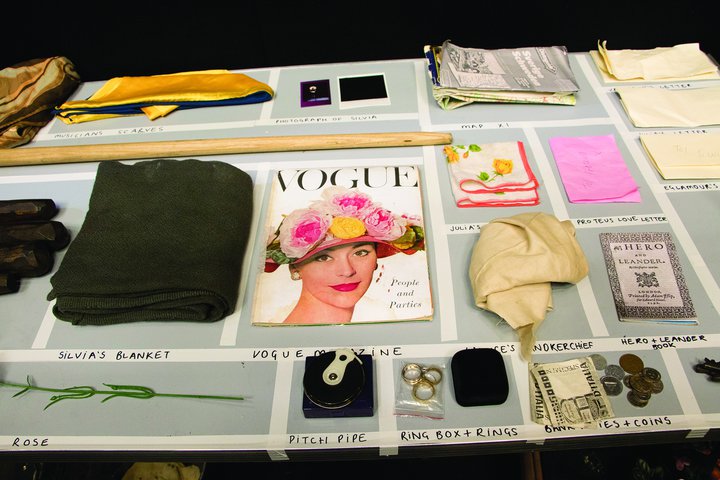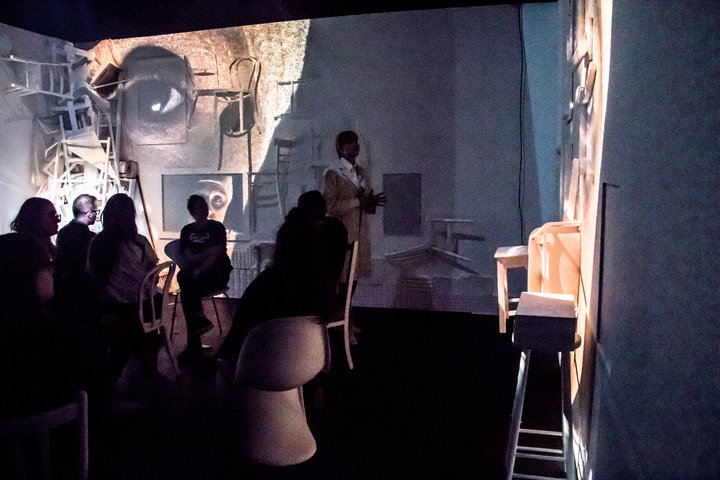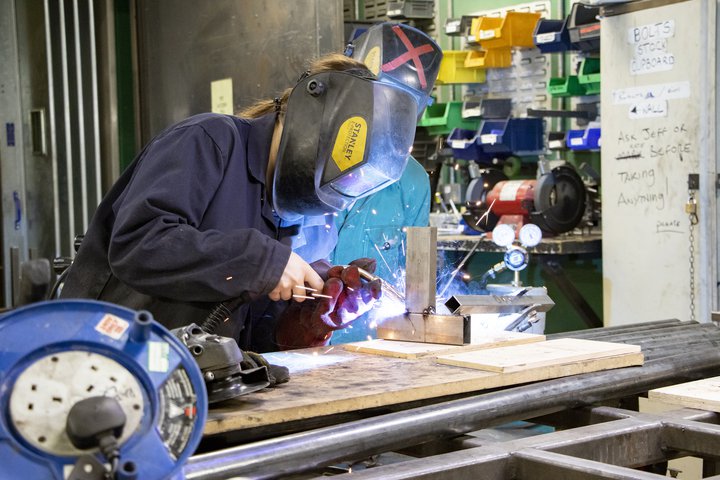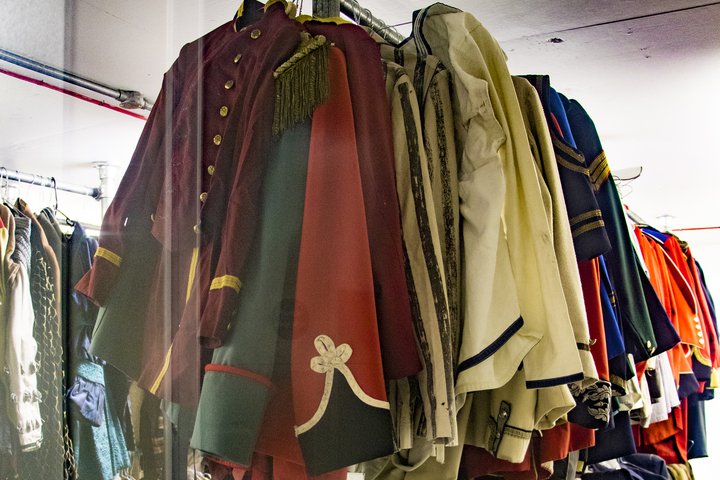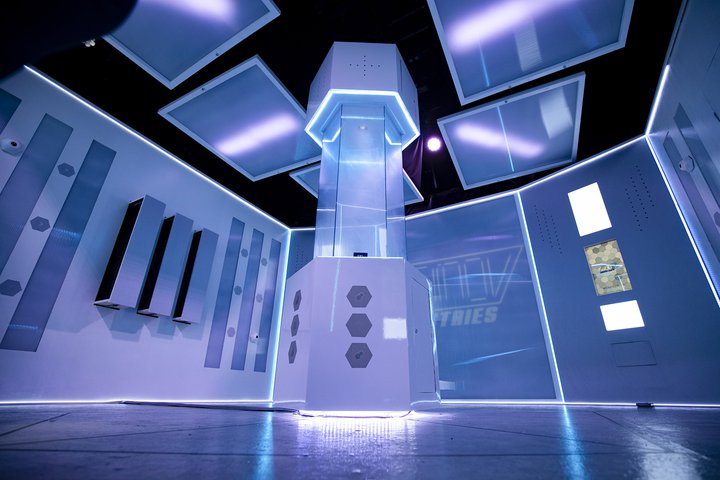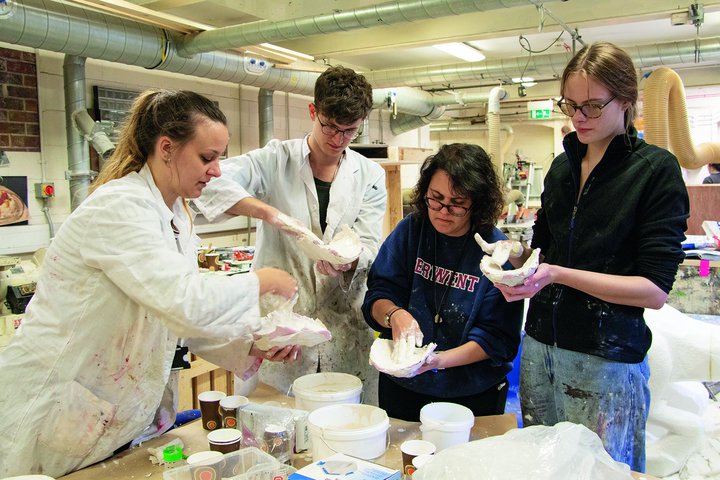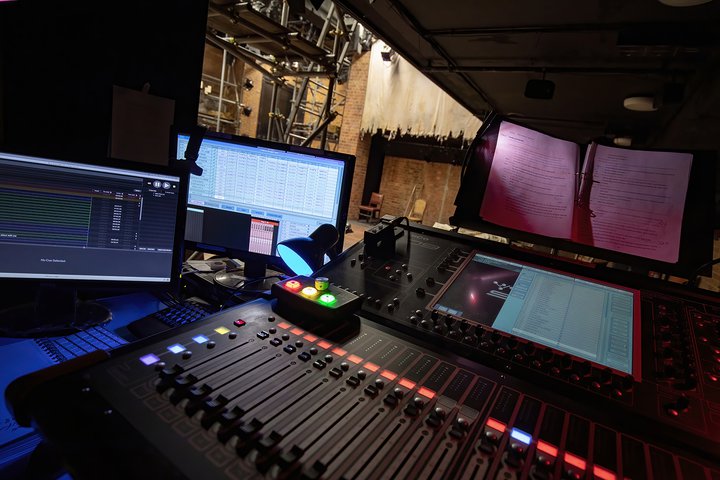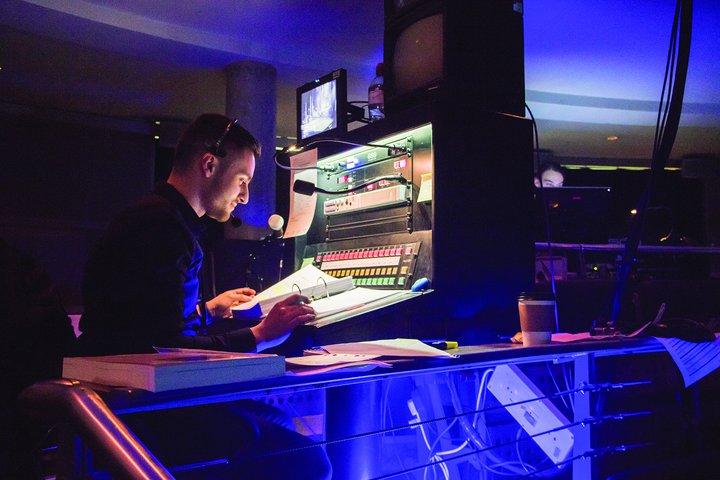FdA in Technical Theatre & Stage Management
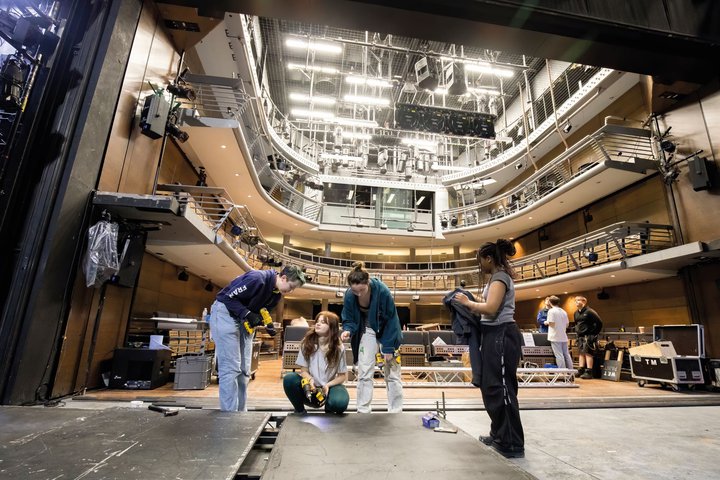
Find out if you're eligible to apply for RADA Connect, a new programme connecting applicants from underrepresented groups into Higher Education.
Is this course for me?
Are you looking for two years of comprehensive training to ground you in all areas of the production arts? If you are a creative, hands-on individual with a passion for the arts and looking to pursue a successful career within theatre, film and television, live events or production, this course is for you.
Course overview
Our belief is that for anyone to successfully specialise in one area of the production arts, they must first be grounded in all areas. This two-year course offers an in depth foundation in all the areas that contribute to a theatre production in the first year, leading to specialism in one or two areas in the second year.
Graduates pursue successful careers across theatre, film and television, events management and events production in stage management, lighting, sound, props, scenic art, construction, video, costume, technical and production management.
The course is designed to lead into the BA (Hons) progression year, and the majority of our students continue to study; however, the FdA is a complete training. Those completing this course will be fully equipped for transition into the industry and their careers beyond.
Find out more about life as a student at RADA here.
Our students learn by doing. Your training will be vocational and practical, focusing on preparing you for work in the industry. Career guidance and professional development sessions are given throughout the course. There are no academic essays or dissertations, our work is practical and collaborative. You will be asked to write a short self assessment every six weeks and written work ranges from risk assessments to technical schematics as part of the training.
After a broad-based first year of training, your second year allows you the opportunity to specialise in the vocational area that interests you, choosing from stage management, lighting, scenic construction, technical management, sound, property making and supervision, production management, video, scenic art or costume.
From the outset, you will work on RADA public productions – we stage between 12-15 shows a year – as crew and/or operator. These productions are directed by professionals and often involve professional designers. In your second year you will work in more senior roles. These include but are not limited to: stage manager, deputy/ assistant stage manager, wardrobe supervisor, production electrician, lighting programmer, production sound engineer, production video engineer, scenery builder or project manager, production manager, technical manager, scenic artist, broadcast/ camera supervisor, props supervisor. After a broad-based first year of training, your second year allows you the opportunity to specialise in the vocational area that interests you, choosing from stage management, lighting, scenic construction, technical management, sound, property making and supervision, production management, scenic art or costume and wardrobe.
From the outset, you will work on RADA public productions – we stage between 12-15 shows a year – as crew and/or operator. These productions are directed by professionals and often involve professional designers. In your second year you will work in more senior roles. These include but are not limited to: stage manager, deputy/ assistant stage manager, wardrobe supervisor, production electrician, lighting programmer, production sound engineer, scenery builder or project manager, production manager, technical manager, scenic artist, props supervisor.
You will also undertake a professional placement in your second year for up to six weeks with a theatre company, organisation or practitioner. Examples of recent student placements Aspects of Love, Royal Opera House, Delfont Macintosh, National Theatre, Donmar Warehouse, Barbican, Propworks, Flare lighting.
The course combines in-depth technical instruction with insight into the organisational, management and collaborative skills that form the core of successful work in theatre and other areas of the entertainment industry, like film, radio, television, conferences, events and other commercial ventures.
We encourage personal development, considered reflective practice and strong individual growth because these are the skills that will support you through a complex, high-pressured and rewarding career.
RADA also regularly hosts guest speakers, comprising leading figures from a wide range of industries and walks of life – from politics and arts, to photography, neuroscience and religion.
Students benefit from the RADA Buddy mentoring scheme, which supports your transition from student to professional with graduate ‘buddies’ providing professional advice, feedback and networking opportunities.
Although the Foundation degree is intended as a complete vocational training in itself, students who pass our FdA will now automatically be considered for the BA (Hons) progression year - enabling students to deepen their specialist knowledge further in one or two areas of technical theatre or stage management.
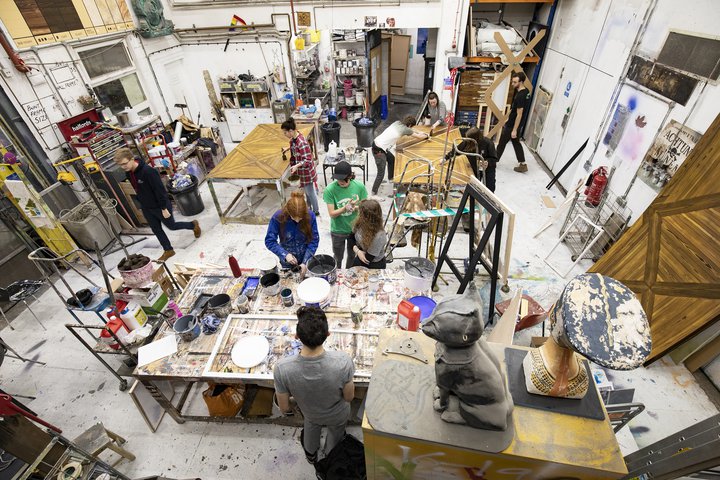
Core disciplines making up the FdA TTSM are:
- Stage Management
- Prop making
- Costume and Wardrobe
- Scenic Construction
- Scenic Art
- Lighting
- Sound
Our disciplinary teaching is built around the three core strands:
- Context – historical, political, cultural, social, managerial
- Design
- Stagecraft and Production
Through which we work with students to develop:
- Professional practice
- Theoretical understanding
- Management, teamwork and leadership skills
- Interpersonal communication skills
- Career aspirations
Timetable and workload
This is a full-time course of two academic years, each running from September to July and divided into three terms.
At RADA, we expect students to work up to 35 hours a week, often more when working on an Academy Production.
Our definitions:
- Contact Hours – the hours spent in contact with academic staff for the purposes of learning, teaching, and assessment (including feedback); undertaken online or in person.
- Directed learning – when it is clear which activities a student needs to be doing in order to be prepared for upcoming live (either online or in-person) interactions.
- Self-directed learning – the autonomous learning students are always expected to do whilst studying at an HEI, reading beyond the core materials or from selected reading lists.
Each year there is an intake of up to 36 students, typically taught in groups of six.
You can find our term dates up to summer 2025 here.
Assessment
You are assessed using continuous, formative and summative methods.
Your continuous and formative assessment includes classroom observation and feedback, classroom presentations and feedback, reflective journal and portfolio review, 1:1 and group tutorials.
Summative assessment is given at the conclusion of production or project work. You will also be assessed on portfolio work as appropriate.
The FdA in Technical Theatre and Stage Management is a vocational course. Students are assessed entirely on their practical work. Assessment follows six ‘rotations’ or blocks of performance throughout the year, where students are assessed on production roles, project work or placements. Students across the course complete a self-assessment which is an opportunity to reflect on their learning.
Credits
Year 1 (120 credits)
Year 2 (120 credits)
You must complete both years to be awarded the credits. You are unable to take credits earned if you leave the course early.
Year 1 (level 4) modules include:
- Contextual and Development studies (20 credits)
Introduction to stagecraft and Production Environment (20 credits) - Introduction to design (10 credits)
- Introduction to Stage Management and Prop Sourcing (20 credits)
- Introduction to Prop Making (10 credits)
- Introduction to Costume and Wardrobe (10 credits)
- Introduction to Scenic Construction (10 credits)
- Introduction to Scenic Art (10 credits)
- Introduction to Lighting (10 credits)
- Introduction to Sound (10 credits)
Year 2 (level 5) modules include:
- Contextual and Development Studies (10 credits)
- Advanced skills (10 credits)
- Production practice 1 (20 credits)
- Production practice 2 (20 credits)
- Placement (20 credits)
Elective modules:
- Production Practice 3 (20 credits)
- Production Practice 4 (20 credits)
- Project 1 (20 credits)
- Extended Project 1 (20 credits)
- Extended Placement 1 (20 credits)
At levels 5, in addition to the core modules comprising 80 credits, you will opt for a 40 Credit combination of modules. Whilst we will consult with you about your allocation to disciplines, productions, placements and projects, for reasons that include student numbers, material and learning experience, the final decision rests with RADA and the DTT.
All course elements are compulsory. Students must pass all elements of their first year to progress through into their second year (first year marks do not count towards the final award). The final award is determined through a credit weightedn average of all marks in the second year.
The work placement module is assessed on a pass/fail basis, and is required to earn sufficient credits to complete the course, but does not count towards the final award.
What do I have to do to pass?
In order to pass the programme you must achieve the credit for each module and you must achieve an overall mark of 40 to pass each module.
This programme can lead to one of two awards:
- on successful completion of all level 4 modules, the Certificate of Higher Education (CertHE);
- on successful completion of all level 4 and 5 modules the Foundation Degree (FdA).
The CertHE is awarded without classification.
For the FdA the following overall grades are needed for recommended awards:
70% minimum for pass with Distinction
60% minimum for pass with Merit
40% minimum for pass
Teaching staff
Visit our theatre production staff list to read about our faculty.
During the first year, initial information and instruction swiftly folds into physical action and practical skill building, culminating in work on our public productions. You cycle through the technical production areas over each half term, alongside which you will also receive ongoing training throughout the year in a number of areas, notably:
- stage management
- theatre history
- stage, light and sound design
In the second year, you will specialise in a chosen area and work through production roles in your chosen field.
Example of roles available:
- stage manager
- production electrician
- wardrobe supervisor
- deputy stage manager
- prop maker
- technical or production manager
- assistant stage manager
- scenic artist
- lighting programmer
- production sound engineer
- construction Head of Department (HoD) or scenery builder
You will also undertake an industry placement.
As well as undertaking production roles you will have the opportunity to develop your skills either by undertaking project work in your chosen skill areas, such as property making, costume making, scenic art and scenic construction; by taking part in projects based on alternative theatre styles and digital production processes.
We encourage the opportunity for training regardless of age, gender, disability, ethnicity, marital status, nationality, sexual orientation, parental status, socio economic status, religion or belief. We are committed to promoting equality and diversity, to pursuing non-discriminatory policies and practice and eliminating unfair discrimination.
How to apply
Apply by submitting our online application form, which will be followed by an interview and practical session. See our 'Applying' section below for further details. It is free to apply for this course.
A guide to our online application form
- Applications are online – you can fill out the form on a desktop, mobile or any other device.
- If you find that the form doesn't work, try using a different browser. We recommend Chrome, Edge, Firefox, and Safari.
- We ask questions about you including your address, school address, qualifications and household income.
- We ask for a passport-style photo of you. This can be a selfie or any other photo that clearly shows you from the shoulders up in portrait orientation up to 2MB in size and should be in JPG or PNG format. This is for our records only.
- The information we collect is confidential. Some of it is shared with our audition panel, but we mark this clearly on the form.
- You may be eligible for a free application through our RADA Connect programme. All the information is in the application form so you can find out if this applies to you.
- The application will automatically save as you progress, if you want to take a break or come back to the form at a later date, you can simply close the browser and log back in later
- To ensure you don't accidentally delete your own responses, avoid going back and changing answers.
- Once you have pressed 'Submit' on the application form you can no longer edit, so please make sure you have filled out everything correctly.
- You will receive a confirmation email to say your form has been submitted.
Entry requirements
We require you to have achieved a standard of education which means you can study for a foundation degree, but we do not require specific A levels or other qualifications. All eligible applicants are interviewed.
You must:
- be 18 years old by the first day of the induction week in your programme of study
- Have complete fluency in spoken and written English – see below.
- have some practical experience of theatre production disciplines or related activity
- demonstrate an intellectual, creative and practical ability to undertake foundation degree training
- be able to talk enthusiastically about your passion and experience at interview
- be able to show an understanding of the nature of the work
English is not my first language. How is fluency in English assessed?
Applicants should have excellent conversational English and be able to understand a variety of texts. As with all applicants, during the workshops, the panel will consider how you are able to interact and converse with them.
If English is not your first language, you may need to provide proof of your English language ability. For more information see our English Language Requirements guide or contact admissions@rada.ac.uk.
Admissions process
For entry in September 2024 there will be a practical workshop and interview, which will be scheduled in the same day. We expect these to be in-person, on-site, at RADA. Travel bursaries are available for applicants who live in the UK. If you live outside of the UK, and coming to RADA is not an option for you, we will offer a workshop and interview via a digital platform (likely to be Zoom). Workshop days are scheduled to take place in December 2023, January 2024 and April 2024. If you are successful, you may be offered a place immediately after the workshop day.
Do note that, due to the volume of applicants we interview, we cannot provide feedback – please refer to the RADA Admissions Policy for more information.
Find more details about what to prepare for each stage of the interview process in our Admissions Procedure Guide.
Information for disabled applicants
We welcome applications from disabled applicants and encourage them to disclose relevant information regarding any disability when completing their application form, to enable us to provide additional support during the admissions process.
Find out more about the ways RADA support disabled applicants in our Student Life pages.
If you are a disabled applicant and would like further advice or guidance, please contact the admissions team directly on admissions@rada.ac.uk.
Admissions, appeals and complaints
For information about RADA’s admissions, appeals and complaints procedures for higher education courses, please download and read our Admissions, Appeals and Complaints document.
This process covers all of our Higher Education courses.
Policies, terms and conditions
If you would like to know more about RADA’s admissions policies for higher education courses, please download and read our Admissions Policy.
Please download the RADA Fees Policy for more information about fee levels and increases, deposits and payment.
Please see our Student Protection Plan for information about how we protect your rights.
You can read our terms and conditions for students.
You may be eligible to apply to RADA Connect, a new programme connecting applicants from underrepresented groups into Higher Education.
Check if you are eligible and find out more about the programme.
Travel bursaries
If you join RADA Connect and successfully progress through the application process, you will also be considered for a travel bursary for the fourth round of the auditions, which we will hold in person at RADA.
We will require evidence of need and household income. We do not set a specific amount paid for travel bursaries as it will depend on the distance travelled and mode of transport. We will only pay travel bursaries for travel within the UK in standard class.
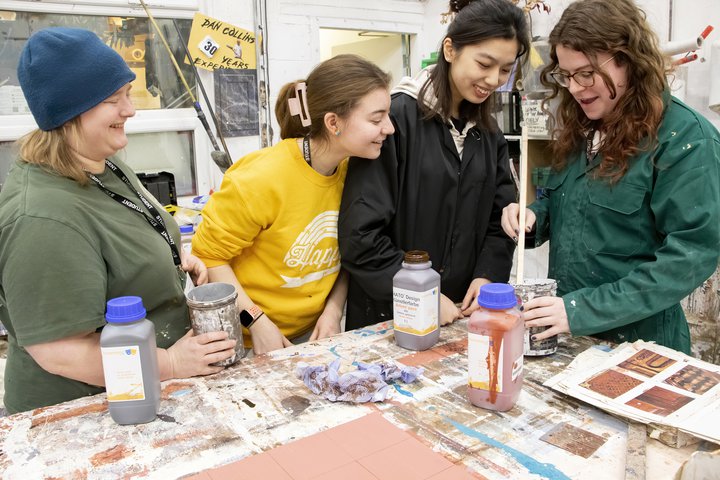
Tuition fees
Undergraduate fees for the academic year 2023-24
Home (UK) students
£9,250 per academic year
International students
£23,940 per academic year
See below for information on whether you are classed as a Home (UK) or International student. This affects the fees and also the financial support available. For Home (UK) students, please note that our fees are regulated by the Office for Students.
The course is two years in length, so for Home students the total tuition will be not less than £18,500. For international students, the total tuition will be not less than £47,880. For international students, please note that we are likely to increase your fees year on year by a cost of living amount.
Please see the fees policy for more information about how RADA calculates tuition fee increases for each year of a course..
UK or international student?
There are strict regulations regarding residency which must be met in order to qualify for Home (UK) student status.
Home (UK) student
In order to be classed as a Home (UK) student you normally need to meet all of the following criteria on the first day of the first academic year of the course:
- You are settled in the UK (this means there is no immigration restriction on the length of your stay)
- You are ordinarily resident in the UK, and have been for the full three years before the first day of the academic year (ordinarily resident means that your main home is in the UK, and you are choosing to live in the UK)
- The main reason for you being in the UK is not to receive full-time education
Irish nationals who have been living in the Republic of Ireland or the UK can qualify for Home fees as long as they meet the residence requirements which can be found on the UK Council for International Students' (UKCISA) website.
International students
If you do not fall under the Home (UK) definitions, then you will be classed as an international student.
International students coming to RADA on a full-time course of more than six months will require a Student visa before coming to the UK to start your course. Without the visa you will not be allowed to enter the UK. Please visit the UK Visas & Immigration website for further details.
The definitions on this page are only a very brief summary and there are a number of exceptions to the conditions listed. For more detailed information, please refer to the UK Council for International Student Affairs guide.
Other costs
Almost all materials and resources you require for your courses, including travel for any trips, are included in your tuition fees.
You will undertake a placement of up to six weeks as part of this course. For the majority of students, this will not mean any additional costs. You can apply for additional financial support from RADA if your placement means that you incur additional costs, such as travel.
Other materials costs: £300 + laptop
The things not covered include protective footwear, practice clothes, play texts and stationery. International students will have costs associated with the Student visa. Please visit the UK Visas & Immigration website for further details.
Laptops, phone/tablet devices and related equipment
To participate in this course, including any online training, you will need to have the equipment see more information on the document here. Prices for laptops may vary but costs are likely to be in the region of £550 and upwards. Educational discounts are available, so we advise that you wait until you are enrolled before buying any new equipment. We recognise that not all applicants/ students will own this equipment or be in a financial position to purchase it. RADA, therefore, has ways in which we can provide you with support to ensure that you can access the equipment you need.
More information is available from the admissions team by emailing admissions@rada.ac.uk.
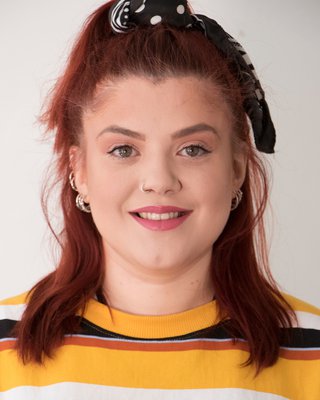
Funding your training
It is important that you understand when you accept a place at RADA that you know how you will pay for it and whether you will need financial assistance. We do not take account of financial need when offering places, but we do reasonably assume that if you are applying to come to RADA, you will be able to pay the fees and support yourself.
Although applications are made directly to RADA, not through UCAS, RADA is a Registered Provider with the Office for Students. This means that our courses are eligible for student financial support.
RADA also offers a number of scholarships, the majority of which are awarded on the basis of income to undergraduate students studying in higher education for the first time.
Applying for a student loan
You can apply for a student loan for your tuition fees and living costs (maintenance) if you:
- are a Home (UK) student
- have not already completed a course at the same level (for example another BA degree)
Tuition fee loans are not means tested and this means that you do not have to pay any fees upfront for your course.
Depending on your home/residency country, you will also be able to take out a maintenance loan to support you in your studies. These loans are means tested and will depend on whether you are living at home or independently. Information about how much you can borrow and a student finance calculator are available on the student finance website.
Scholarships
RADA offers a number of scholarships. The majority of our scholarships will be awarded on the basis of income to undergraduate students studying in higher education for the first time.
We have a limited number of scholarships for second degree students. We do not usually offer scholarships to international students from outside the UK.
Means-tested scholarships
For UK student, new to higher education, starting an undergraduate course in September 2024, we offer the following awards:
Income under £45,000
Minimum award of £3,000 for each year of study
Care leavers
In accordance with our 2020 – 2025 Access and Participation Plan, RADA offers an additional scholarship to care leavers (for living costs) of £3,000 per year for each year of study. This is for UK students on undergraduate courses.
Students are invited to apply for scholarship support once they have been offered a place.
Support for UK undergraduates taking a second degree
Second-degree students are not eligible for government-sponsored loans for a degree at the same or lower level.
RADA welcomes applications from UK students who already hold a degree from another institution or in a different subject, and we hold a small number of places at the UK fee rate for such students.
You will need to finance yourself for both fees and living expenses. We have a very limited number of scholarships, which include full-fee and/or full-maintenance scholarships, for students who are not eligible for student finance. Please see the scholarship section above.
It is in your interest to provide us with information about how you intend to pay for your fees and support yourself through training, if you are not eligible for government-sponsored student finance. We will prioritise students from low-income backgrounds and from groups under-represented in the profession in allocating financial support.
International students are required to pay the full cost of their fees and living costs and are made an offer on the basis of paying privately. However, all funding issues are discussed individually with each student once an offer has been made.
Support for international students
If you are defined as an International student, you are required to pay the full cost of your fees and living expenses. Your offer is made on the basis that you can meet these expenses from your own funds. There are also financial requirements associated with the allocation of a Student visa. Please visit the UK Visas & Immigration website for further details.
RADA is not, at present, eligible for US Federal Loans.
Graduates from RADA’s FdA in Technical Theatre and Stage Management can be found practising their professional skills across the industry. The majority of the current year group go on to a progression year at RADA to obtain a BA (Hons) in Technical Theatre and Stage Management. Other graduates go directly into the profession.
Graduates pursue successful careers in stage management, lighting, sound, props, scenic art, construction, video, costume, technical and production management. Graduate go on to work in theatre, film, television, live events production and escape rooms.
Theatre production training also gives a grounding in skills that transfer well to other careers, including managing other people, budgeting and time management.
Recent graduate destinations
Here is just a selection of recent destinations of our theatre production graduates.
Theatre and opera
- Almeida Theatre
- Bush Theatre
- Buxton Opera House
- Cambridge Theatre
- Chichester Festival Theatre
- Dominion Theatre
- Donmar Warehouse
- Everyman Theatre, Liverpool
- Finborough Theatre
- Garsington Opera
- Glyndebourne Opera
- London Coliseum
- Lyric Hammersmith
- Menier Chocolate Factory
- National Theatre
- New Wimbledon Theatre
- Orange Tree Theatre
- Oxford Playhouse
- Park Theatre
- Regents Park Open Air Theatre
- Royal Court
- Royal Opera House
- Royal Shakespeare Company
- Southwark Playhouse
- St Martin's Theatre
- Theatre503
- Theatr Clwyd
- Theatre Royal Drury Lane
- Trafalgar Studios
Film and television
- BBC
- Netflix
Events and special effects
- INCA Productions
- Lewes Light Festival
- Quantum Special Effects Ltd.
- Viking Line Cruises
- Youth Winter Olympics
Applicants must be at least 18 by the start of the academic year. We do offer other opportunities for young people under 18, including Access and Participation projects and Short Courses.
There is no upper age limit and all applicants over the age of 18 who apply will be offered an interview.
RADA does not use the UCAS service for applications and we have an independent admissions process. Apply via the online application form at the top of this page.
We require you to have achieved a standard of education which means you can study for a foundation degree, but we do not require specific qualifications or A-Levels. All eligible applicants are interviewed. The panel will be looking at experience, but also at your suitability for the training and passion for the subject.
We no longer produce a physical prospectus. All our information on full-time courses can be found on the RADA website, including course content, costs and funding, graduate destinations, the application process, welfare support and where to live.
Due to the restrictions RADA has in place in response to Covid-19, we are unlikely to be able to hold in-person open days this year. We are planning to share digital events, if this changes we will let you know. Sign up to our mailing list here to receive information.
You will receive an automated email confirming receipt of your application when you have submitted it. We will then contact you with a date for your interview. Interviews are likely to start in January 2023.
If you are ill on the day, please email admissions@rada.ac.uk in advance of your interview time.
Where possible, we will try to provide an alternative date, but this may not be possible as it is dependent on where we are in the admissions process.
No. You should apply for a place in the year before the September you wish to begin your training.
There are different fees for UK and international students. You must have lived in the UK for three consecutive years prior to starting the course in order to qualify for UK level tuition fees.
If, for example, you were born in the UK but then moved to Australia for twenty years, you would be liable to pay the international rate.
Please read the information under 'Tuition fees' to know if you are an UK or international student.
If you are a UK student new to higher education, you can apply for a student loan for your tuition fees and living costs. If you are an international student, you are required to pay the full cost of your fees and living expenses. Your offer is made on the basis that you can meet these expenses from your own funds.
We do not usually offer scholarships to international students from outside the UK.
Read full details in our ‘Costs and funding’ section.
RADA is not, at present, eligible for US Federal Loans.
The UK left the EU on 31 January 2020. In June 2020, the UK government announced that EU, other EEA and Swiss nationals will no longer be eligible for home fee status or financial support from Student Finance England for courses starting from the 2021-22 academic year onwards. This does not apply to Irish nationals, or anyone who benefits from Citizens’ Rights under the EU Withdrawal Agreement, EEA EFTA Separation Agreement or Swiss Citizens’ Rights Agreement.
You can read the full government announcement here. Please see www.gov.uk for more details.
Course hours will regularly include evenings and Saturdays, especially during production weeks, so there would be little opportunity to work during term time.
It is important that students have a balance of study and rest throughout their time at RADA to enable them to complete their training satisfactorily. Note that a formal work placement is part of the FdA in Technical Theatre and Stage Management.
There is an intake of between 30-36 students each year, typically taught in groups of 6.
You can find our term dates up to summer 2023 here.
Generally, we do not accept student transfers into our higher education courses. For our higher education Theatre Production courses (FdA Technical Theatre and Stage Management, one-year BA (Hons) Technical Theatre and Stage Management top up award and PgDip Theatre Costume), we are unlikely to accept students part-way through the course. We take students from other institutions into the BA (Hons) in Technical Theatre and Stage Management (Progression year), but not part-way through the year and they must apply and be interviewed as with all applicants.
We are not able to support students transferring between courses at RADA, particularly between acting and theatre production degrees as these are very different and vocational pathways. A student wishing to change direction would need to be interviewed or auditioned to join one of the other courses.
You can download our policy statement on transferring courses here.
The health and safety of everyone at RADA is our number one priority and we are proud to be See it Safely approved by Official London Theatre, so students, staff and visitors who visit and work inside our buildings can feel confident are always Covid-secure based on the latest UK Government and NHS guidelines.
Due to the restrictions in place in response to Covid-19, all initial interviews will now take place online. We expect to run a second round in-person workshop in London but this is subject to change according to Government health advice.
We are hoping to be able to welcome you to RADA before you accept your place but are currently planning to hold digital events so you can get an insight into our facilities and find out more about what it is like to come to RADA; sign up to our mailing list here to receive information including any changes to our plans.
Current RADA students are continuing their courses with a combination of in-person and online training. We will continue to adapt our training in light of changing government protocols and advice, but please note courses beginning in September 2023 may encompass some elements of online training.
As a Government regulated institution, sometimes our ability to open to the public and visitors is out of our control. We will always communicate clearly with applicants as circumstances change. Please read more about our Covid-19 protocols here.
Only in exceptional circumstances, on a case-by-case basis.
We hope so! We will do our best to give you a tour but there is no guarantee. If you are under 18 at the time of the tour - please bring a parent or guardian with you.
Between 25 -45 mins
To participate in this course, including online training, you will need to have the equipment. We recognise that not all applicants/ students will be in a financial position to purchase this. Please see 'other costs' in the Costs and Funding section for more information and contact the admissions team by emailing admissions@rada.ac.uk.
Read our regulations and policies relating to admissions and current students here.

